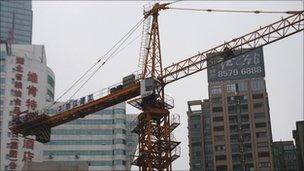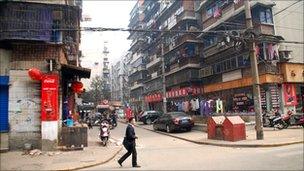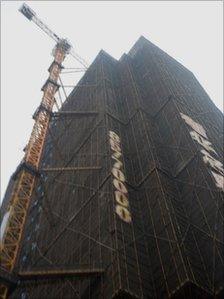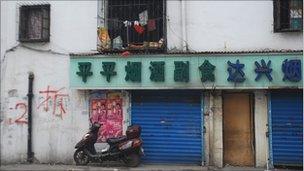China could rue hasty dash for growth
- Published

Wuhan is undergoing a construction boom
China has overtaken Japan to become the world's second-largest economy - a landmark achievement, but one that is not attracting much attention in the country itself.
Perhaps that is because it is obvious to any observer that China lags behind its Asian neighbour in so many measures that matter to the people that live here.
China's huge population means the average wealth per head is a fraction of that in Japan.
Living standards are considerably lower in much of the country, particularly in rural areas.
But it could also be because of concerns about how sensible and how sustainable the current growth model is in the long term - and what costs are being incurred in the dash for growth.
The city of Wuhan in central China is not as famous as Beijing or Shanghai. But in many ways, it is more like the rest of China than either of them.
It is a sprawling, rather grimy industrial town. Its population is as large as Sweden's.
The biggest employer, a steel works, employs 90,000 people.
One of China's great rivers, the Yangtse, cuts through the middle of the city, but from the riverbank it is hard to make out the buildings on the other side.
The city is shrouded in a grey haze which residents blame on pollution from the region's factories.
Business boost
Steve Carpenter, a US businessman who has been working here for several years, has witnessed rapid changes in the city he now calls home.

Wuhan is a rather grimy industrial town
There are more cars on the road, the local government is expanding the city's light rail system and building a metro and skyscrapers are promised as part of the construction boom here.
"The economy here in Wuhan, and in China in general, has been very good for my business," he says, "and for most of my friends too. Ten per cent growth, year after year.
Our company is in the power generation industry and growth is just exploding."
City officials have set themselves a target of 12% annual growth in the next five-year plan, but that is higher than the central government is aiming for.
As a result, there are worries in Beijing that in cities like this one, the economy could overheat if they are not careful.
Trouble ahead?
Professor Wen Jiandong from Wuhan University's economics department shares those concerns.
In China, the central government sets the general direction, of course, but the local government officials have enormous power to plan their own economy.

Professor Wen Jiandong is worried about the future
The perception is that the greater the growth you achieve, the more chance you have of promotion, so they do not plan well, the professor argues.
Instead, they go for short term easy "wins" that will boost the growth numbers at year-end, he says.
"In the short term, the current pattern of growth is really useful," says Prof Wen. "Selling land and building infrastructure projects means the GDP grows really fast.
"In the long term, though, it can harm economic growth because there are so many underlying problems with it. For a start, the local governments are loading themselves up with debt."
And no-one has to take responsibility if something goes wrong. "If there is a problem in the longer term, the officials will already have moved on to another job somewhere else," he says.
Making money
But that is a hard message to get across to those benefiting from the dash for growth.
Simon Liu is a young, bright white-collar worker working for a foreign multinational company.

Property prices are soaring as Wuhan develops
To him, the local economy looks in decent shape. "I feel very optimistic, I feel there are many opportunities for me."
It helps, of course, that he has already bought a house, so he benefits from the rocketing prices for real estate here as the city develops.
Prices have risen so much that the average apartment now costs about 29 times the average salary here.
Simon says he and his friends have just one topic of conversation at the moment: how to help each other make more money. They feel that China is as good a place as any to do that.
"I talk to many of my friends who are older than me. Some of them can easily get an MBA or other overseas education, but they just don't go," he says.
"They feel China is so robust. They are experiencing a dynamic which is just not happening in any other countries."
Left behind
As China has grown to become Asia's largest economy, its biggest achievement, most would agree, has been to raise hundreds of millions of its citizens out of poverty.
But you don't have to walk far away from the main streets of Wuhan to find people who worry they are being left behind.
Xiong Qun Hui owns a small store she has to open 18 hours a day just to make ends meet.
"The change is too fast," she complains. "Sometimes I stay at home to look after the shop, and if it's a while before I leave the neighbourhood, I get totally lost in the city."

Not all of Wuhan is benefiting from the boom
Like Prof Wen, she questions whether the development going on in Wuhan, and the rising prices for real estate that come with it, will really benefit the majority of people who live here - especially those priced out of the housing market.
"This question is hard for the government as well as for the people," she says.
"Why is it that those who can afford properties own many of them, when there are others who don't even have a place to live in.
"How can I put it? This is a problem with the system in this country - and what is wrong with the system. Well, I can't go into that."
For the government, that kind of comment is a worry, because it shows how easily complaints about the economy can turn into criticisms of the country's political system.
Imagine how much worse it would get if the asset prices - housing or land - were to collapse, as some fear could happen, leaving millions of disgruntled investors as unhappy as the poor.
That could threaten the country's stability - and in China, that's always what policymakers are most afraid of.